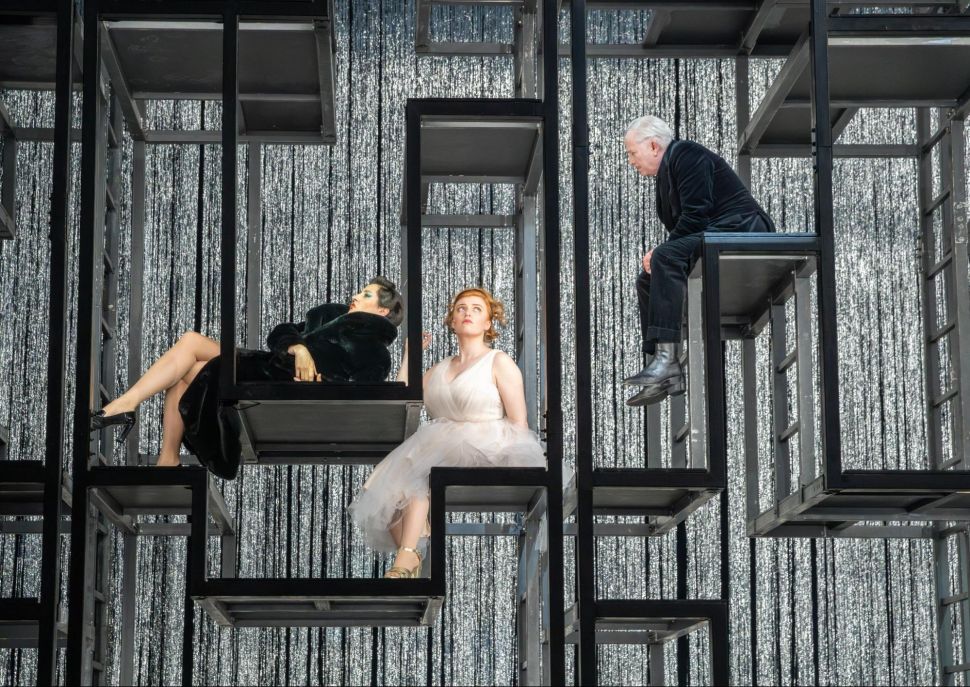If Jonathan Jeremiah Peachum stepped out of The Threepenny Opera—Die Dreigroschenoper for the Herkunftssprechers—and into our world, he would probably be some kind of social media charity consultant. For a fee (and percentage), he can tell you what spin to put on your GoFundMe pleas to cover your medical bills. Peachum would know, as he does in Bertolt Brecht and Kurt Weill’s early masterpiece, that sympathy in an attention economy is easily lost. These days, it takes an LLC just to beg for your bread.
Die Dreigroschenoper was John Gay’s Beggar’s Opera for Berlin in the late 1920s. It’s a testament to how little things have fundamentally changed that the Dreigroschenoper for New York in the late 2020s is still just The Threepenny Opera. Looking down the barrel of a possible recession and an ever-widening wealth gap, the parallels are all too easy to see. Luckily, Barrie Kosky’s Berliner Ensemble production—at BAM for a limited run of performances—doesn’t put too fine a point on these resonances, instead delivering a slick, glam and very funny show in a contemporary-cum-Weimar setting. Elaborate scaffolding takes up almost the entirety of the stage, with glittery black tinsel both in front and behind. The set recalls Art Deco wallpaper: stairs and mazes create rigid, geometric forms that you get stuck in and have to weasel out of. It calls for clambering, slithering and all-around athletic derring-do from the cast, especially its central character, the anti-hero arch-criminal Macheath.
SEE ALSO: Barrie Kosky On Why ‘The Threepenny Opera’ Still Cuts Deep
Berliner Ensemble was founded by Brecht himself and his wife, Helene Weigel, who became the company’s artistic director, and they have all the bonafides to revive one of Brecht’s most popular works: a long history with the piece, a strong cast and some excellent musicians. Weill’s sleaze-classical-dancehall score sounded remarkably lucid under Adam Benzwi’s direction, highlighting the numerous musical jokes from the fake arias to the fake Bach chorales. The entire performance was a clarified cocktail that went down with ease. We open with the most famous tune, “Die Moritat von Mackie Messer” (“Mack the Knife”), here sung by a character called “The Moon over Soho,” in a cute take on the traditional street-singer and glitter-capped Josefin Platt’s smoky, consonant-chewing delivery established the vocal mood.
Die Dreigroschenoper is an opera where the singing—the quality thereof, I mean, not the fact of the songs—doesn’t matter in the least. What does matter is the flair with which the lines are delivered and the individuality and expressiveness of the actors’ voices. On that front, this cast mostly exceeded the task, with sharply drawn comedic characterizations and some rather excellent performances.
After a wonderful introduction to Jonathan Jeremiah Peachum (Tilo Nest, razor-sharp in a double-breasted suit) and the opera’s themes—poverty, cynicism, the threadbare morality of the upper classes—we finally meet Macheath, whose wedding to Polly Peachum (Maeve Metelka, gleeful and game) incites the interpersonal conflict of the whole show.
As Macheath, Gabriel Schneider is lithe and wiry, with a violent poise and sleazy showmanship that makes him riveting. He has an acrobat’s command of his body, able to create shapes, and a nice voice, to boot. The beginning of the second act felt longer for his absence. Metelka’s Polly is a good match for him—she sold “Seeräuber Jenny” with aplomb—but her role simply has less flair after the fireworks-laden numbers of the first act.
Apart from Schneider, who was in a class of his own, the other best-in-show may have to go to Kathrin Wehlisch, in drag as Tiger Brown, a corrupt police chief and former war buddy of Macheath’s. From Wehlisch’s splayfooted walk to her raspy harrumphs to her penciled-in mustache, she was a master of physical comedy. The final bit, where she attempts to feed Mackie his final meal of flaccid asparagus, delivered on a creaky cart, was a tasty morsel of comic gold.
Constanze Becker’s Celia Peachum was another valuable player; she was sultry, cruel and entertainingly world-weary, her long face and black-rimmed eyes like a Modigliani painting come to life as a dominatrix. Her scenes with Tilo Nest, including a tongue-waggling bit straight out of Rocky Horror Picture Show, were tiny triumphs. Bettina Hoppe, as Macheath’s other former lover and prostitute Ginny-Jenny, had a welcome soulfulness–her character is the only one who experiences anything like moral conflict–but her Salomonsong required either a stronger voice or a more creative staging from Kosky.
Laura Balzer’s Lucy Brown was the most outré, replete with shrieks, growls and chitters and a neon outfit that made her seem like a demented Furby or a psychotic sentient gumball machine. The performance was thoroughly amusing until it became overly broad.
Kosky has a sharp eye as a director, especially when working on the scaffolding. Without it, the direction lost a bit of focus. Too many numbers were simply parked and barked, like Ginny-Jenny’s and Lucy’s in Act II. Despite a dragging second act, the final scenes covering Mackie’s execution were both funny and poignant, giving Schneider one more chance to show off his vast emotive and comedic skill set. But lest you feel too much for the lovable rascal, Kosky brings down an illuminated sign reading “LOVE ME” in a pitch-perfect moment that catapults the opera into the age of millennial faux-joking desperation and refuses any emotion that isn’t at least self-aware in its theatricality.
Brecht and Weill draw from an unending (and earned) well of cynicism only to arrive at strange sympathy, one where manipulators and the manipulated know what’s going on. They certainly knew that the theater is not life—the fake-out ending says so—but survival often requires theater. After all, even an artfully ironic plea for help still expresses a sincere need.

